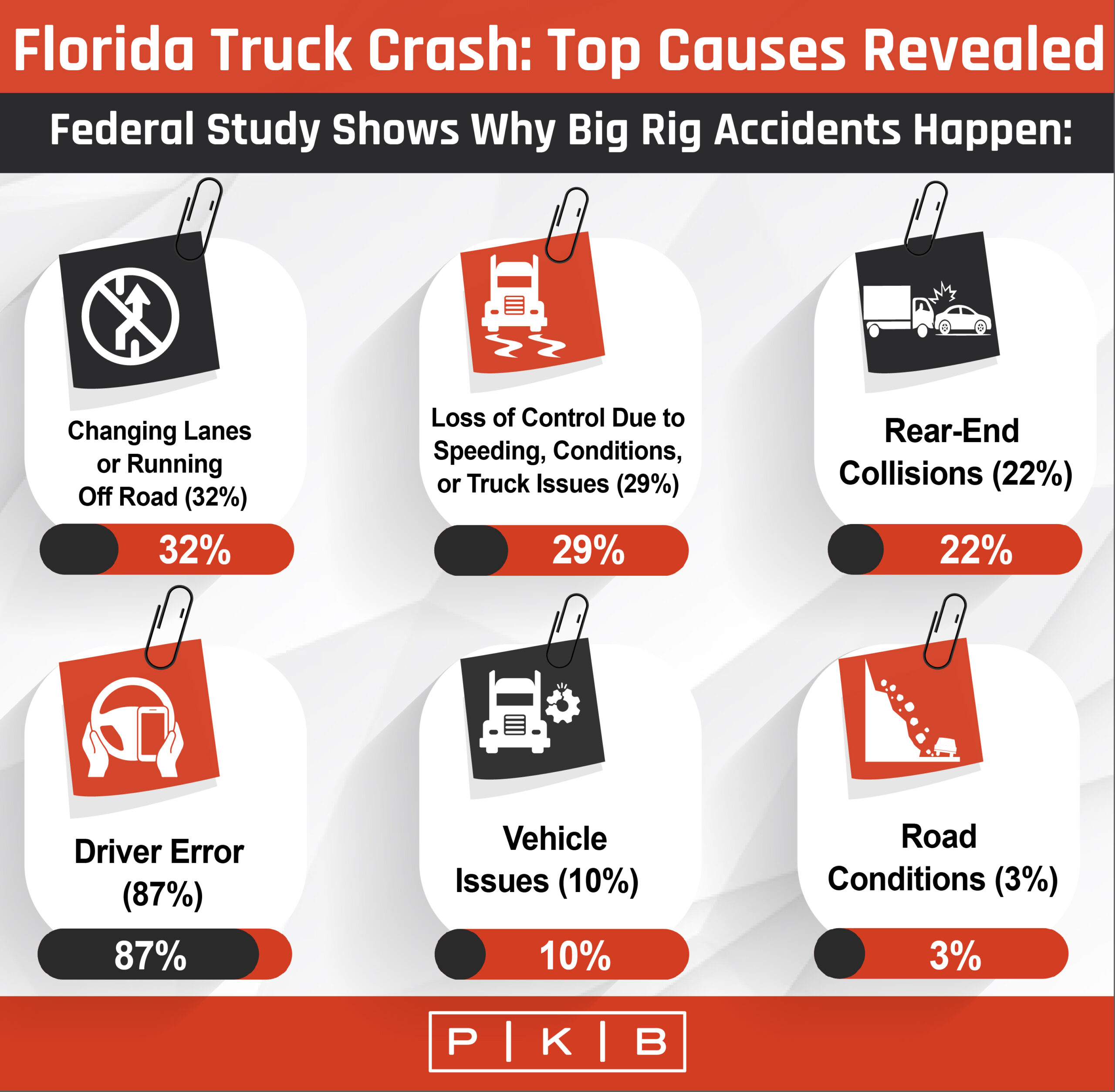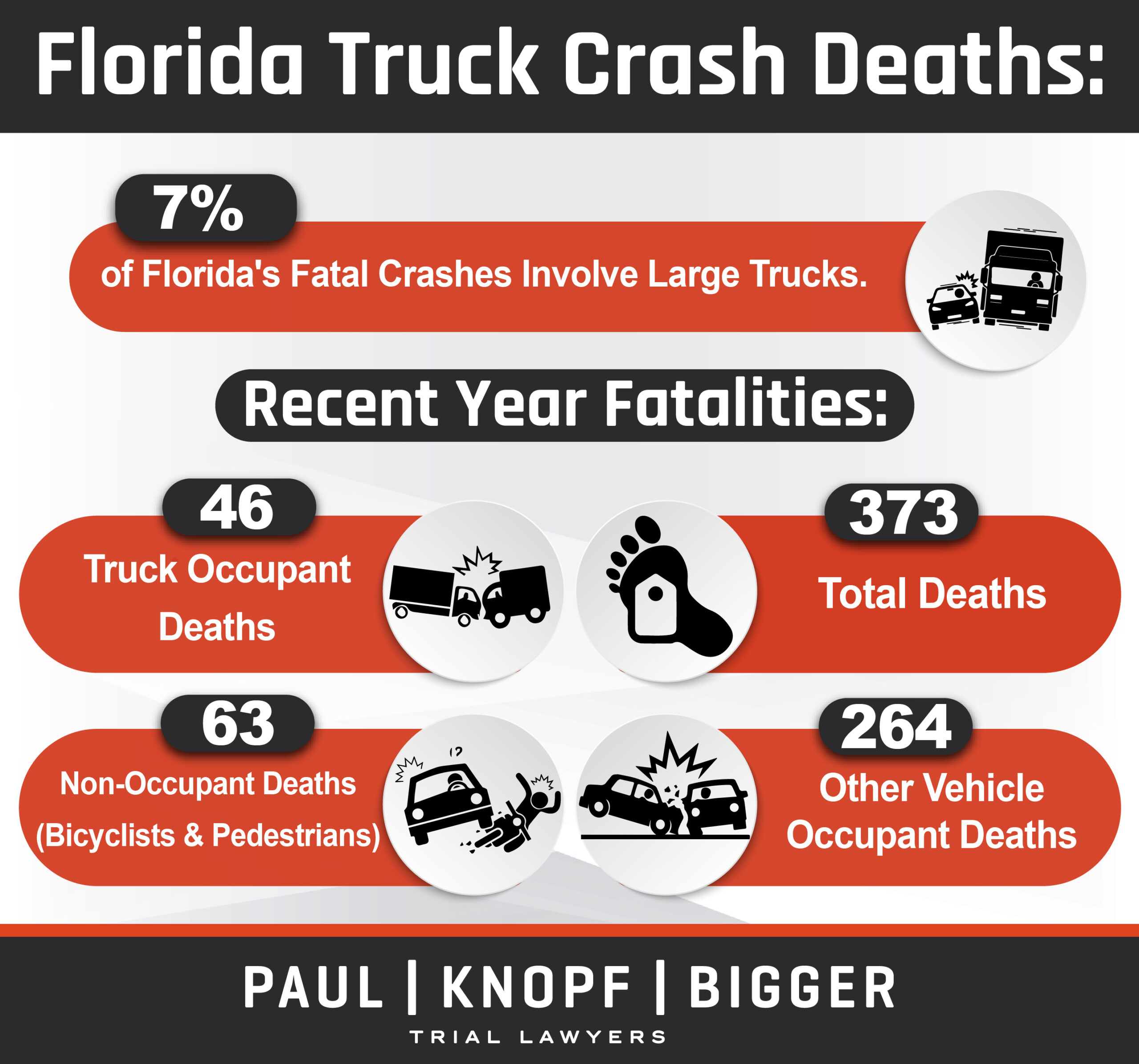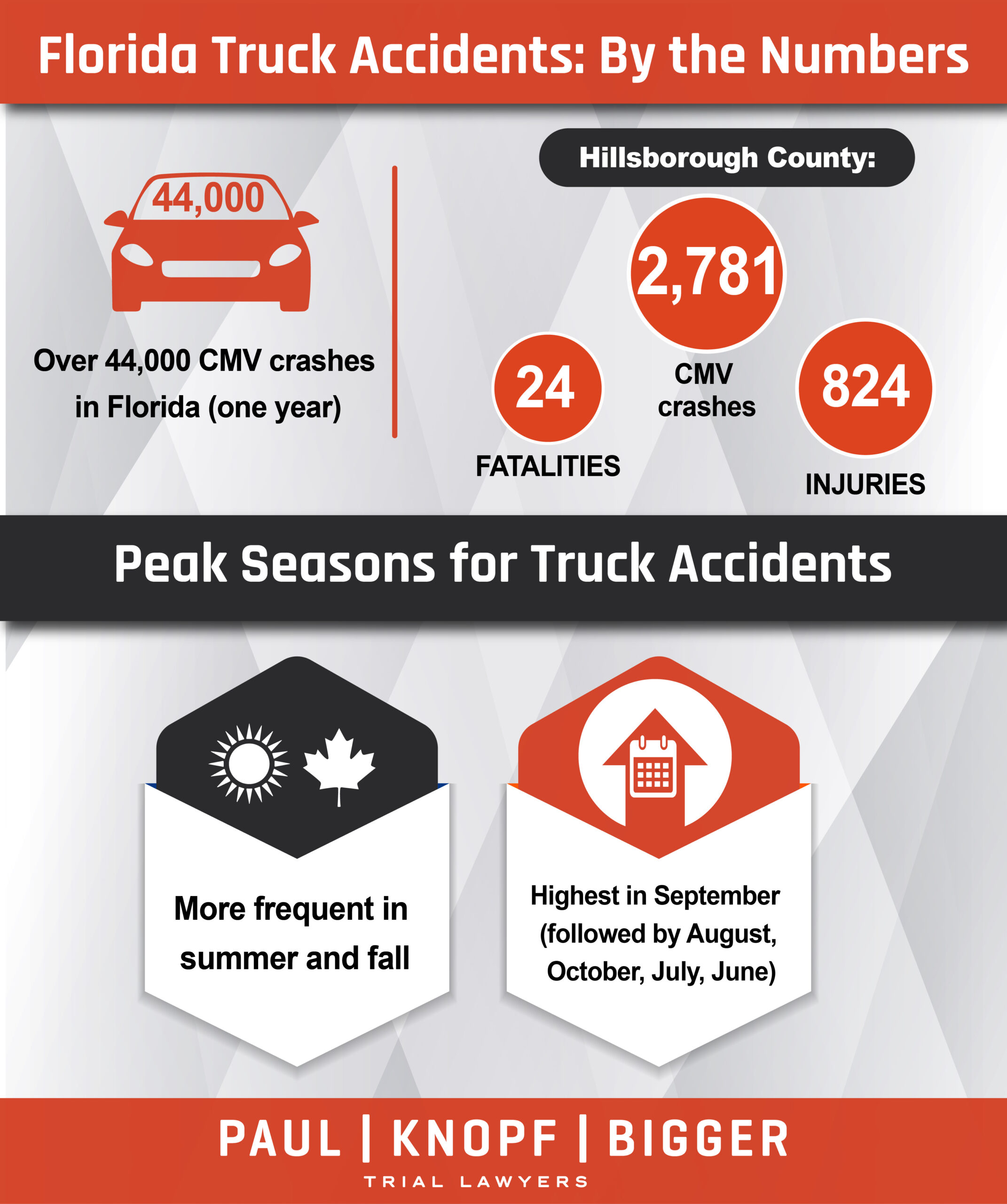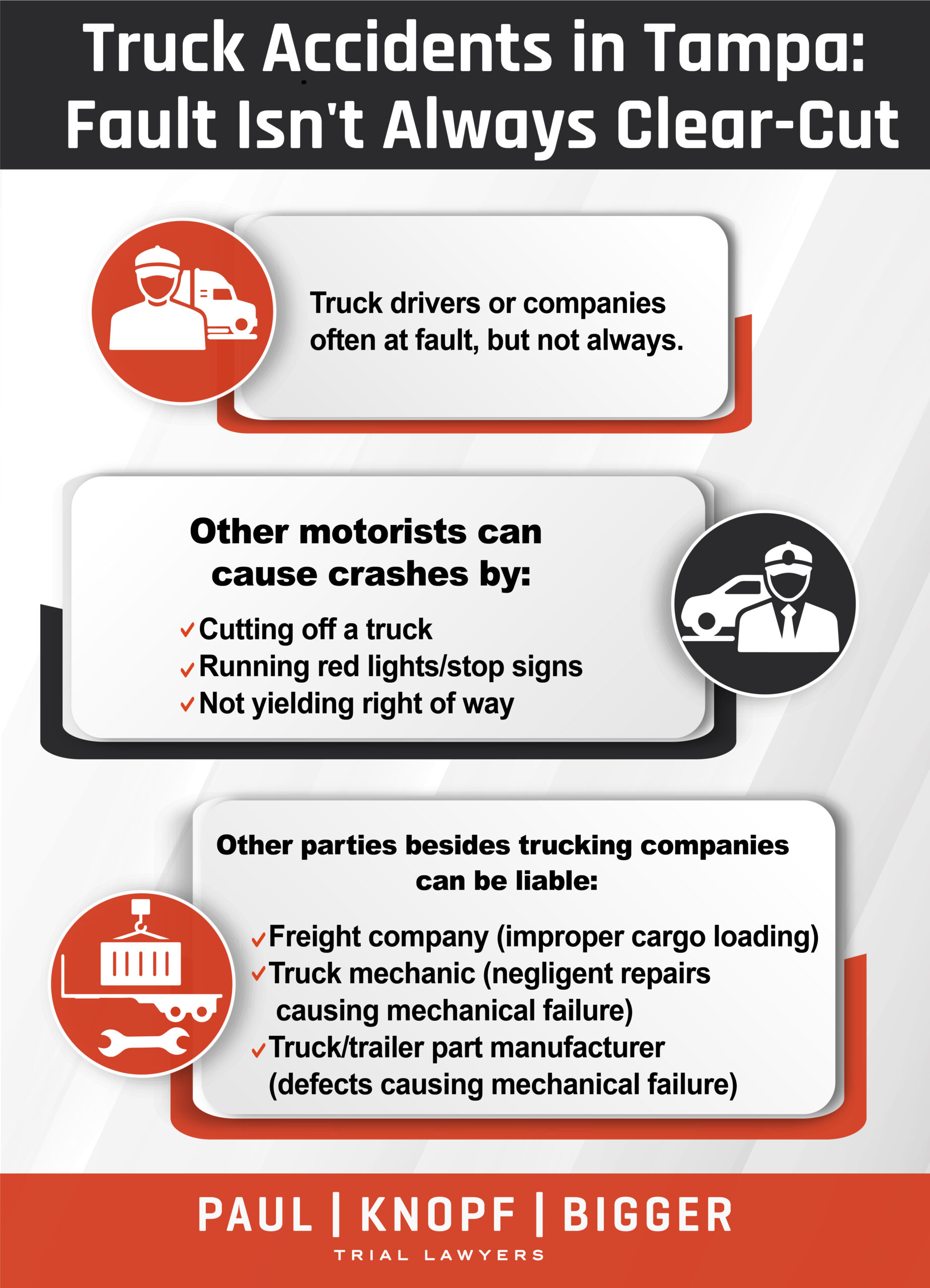Truck Accident Statistics in Tampa - Paul Knopf Bigger
Truck accidents are all too common in a busy area like Tampa. These crashes can have catastrophic consequences, leaving the occupants of other vehicles with serious, life-altering injuries. If you’ve been injured in a truck accident in Tampa caused by a truck driver, you deserve to seek compensation for your medical bills, lost wages, and other crash-related losses. But trucking companies and their insurers will work hard to minimize their liability for your injuries.
You need the help of a Tampa truck accident lawyer from Paul Knopf Bigger to take on large trucking companies and pursue the financial relief you deserve. Contact us for a free initial consultation and learn how our firm will advocate for you.
What Are the Top Causes of Truck Accidents in Florida and Tampa?
A study by the Federal Motor Carrier Safety Administration (FMCSA) and the National Highway Traffic Safety Administration (NHTSA) identified the top causes of large truck accidents.
The study reviewed causation data from various large truck crashes, defining causation as a factor or multiple factors most likely to contribute to the occurrence of a truck accident. The study further defined causes as “critical events,” or actions that make an accident unavoidable, and “critical reasons,” or the reasons or failures that most directly lead to a critical event.
The study identified the following as the three most common critical events that cause large truck accidents:
- Departing one lane and entering another lane or going off the road (32 percent of accidents)
- Loss of control, including due to speeding, traveling too fast for conditions, mechanical failure, cargo shift, or poor road conditions (29 percent of accidents)
- Rear-end collisions (22 percent of accidents)

The top critical reasons for truck accidents the study identified include the following:
- Brake problems
- Traveling too fast for conditions
- Lack of familiarity with the roadway
- Poor road conditions
- Over-the-counter drug use
- Inadequate surveillance
- Fatigue
- Pressure from the motor carrier
- Illegal maneuvers
- Inattention
- External distractions
- Tire issues
- Following too closely
- Jackknifing
- Cargo shift
- Driver illness
- Illicit drug use
- Alcohol use
The study categorized critical reasons as driver-related, vehicle-related, and environmental. Driver-related critical reasons caused about 87 percent of large truck accidents examined in the study. Vehicle-related critical reasons caused 10 percent of accidents, while environmental critical reasons caused only three percent of crashes.
How Many Deaths in Florida and Tampa Are Caused by Truck Accidents Each Year?
The NHTSA reports that approximately 7 percent of fatal accidents in Florida in one recent year involved a large truck. Large truck accidents statewide that year caused 373 fatalities, including:
- 46 truck occupant fatalities
- 264 fatalities of occupants of other vehicles
- 63 non-occupant fatalities (including bicyclists and pedestrians)

What Roads and Highways in Florida and Tampa Have the Most Truck Accidents?
According to crash statistics compiled by the Hillsborough County Sheriff’s Office, some of the most dangerous roads in the Tampa area include:
- Big Bend Road
- S. 301, including at the intersections with Big Bend Road, Gibsonton Drive/Boyette Road, and Sun City Center Boulevard
- Interstate 75
Based on the number of fatal crashes and total fatalities, some of the most dangerous stretches of highway in Florida include:
- S. 19 from San Marco Drive to Denton Avenue in Pasco County
- S. 19 from Queensboro Avenue South to 54th Avenue North in St. Petersburg
- S. 19 from High Street to Embassy Boulevard in Port Richey/New Port Richey
- S. 41 from 30th Avenue East to Pearl Avenue in Bradenton
- S. 90 from Meadowbrook Boulevard to Parental Home Road in Jacksonville
- S. 441 from Northwest 181st Street to Polk Street in Miami, Miami Gardens, Miramar, and Hollywood
- I-95 from Hypoluxo Road to Woolbright Road in Lantana/Boynton Beach
- I-95 from Exit 27 to Exit 32 in Broward County
- I-95 from Exit 4 to Exit 9 in Miami
- I-95 from Exit 20 to Exit 16 in Broward & Miami-Dade Counties
How Often Do Truck Accidents Happen in Florida and Tampa?
According to the Florida Department of Highway Safety and Motor Vehicles, Florida had over 44,000 crashes involving commercial motor vehicles (CMVs) in one recent year. Hillsborough County had a total of 2,781 CMV crashes, which resulted in 24 fatalities and 824 injuries. These truck accident statistics for Tampa are quite severe.

Are There Peak Seasons When Truck Accidents Occur in Florida and Tampa?
According to the National Safety Council, truck accidents occur at higher rates in certain seasons. In one recent year, most fatal truck accidents occurred in the summer and fall. The highest rate was in September, followed by August, October, July, and June. Although crash rates dropped from October to November that year, the numbers increased in December.
What Are Common Causes of Truck Accidents in Florida and Tampa?
Many truck accidents occur due to the negligence or recklessness of truck drivers, motor carriers, or other companies involved in the trucking industry, such as freight companies or mechanics. Some of the most frequent causes of truck accidents in Florida include:
- Speeding or traveling too fast for conditions
- Reckless driving, such as excessive speeding or swerving through traffic
- Tailgating/following too closely
- Failing to yield the right-of-way
- Failing to check mirrors and blind spots
- Not using turn signals
- Unsafe turns or lane changes
- Illegal maneuvers
- Unsafe cargo loading, including overloading the truck/trailer, not securing cargo from shifting or falling out, or not balancing the cargo load
- Drowsy/fatigued driving
- Driving under the influence of alcohol or drugs
- Distracted driving, especially using a cell phone while driving
- Truck driver inexperience or unfamiliarity with the truck type
- Unfamiliarity with the road or traffic pattern
- Inadequate truck/trailer maintenance
- Failure to perform pre-trip inspections
- Truck/trailer or auto part defects
- Poor road conditions, including broken pavement/potholes, slippery road surfaces, or debris on the road
- Adverse weather conditions, such as heavy precipitation, fog, or high winds
- Poor visibility or low lighting

Are Large Trucks Usually at Fault?
Although many truck accidents are the fault of truck drivers or trucking companies, other parties may bear responsibility for a crash in certain circumstances. Another motorist can cause a truck accident if they are negligent or reckless. For example, a driver who cuts off a large truck, causing the truck driver to brake or swerve and lose control of the vehicle, could be responsible for the crash. Or, a motorist who runs a red light or stop sign or fails to yield the right-of-way to a truck and causes a crash could be liable.
Even if a truck driver causes a crash, a company other than the trucking company may bear liability for the accident. For example, a freight company can be liable if it improperly loaded cargo into the trailer, such as by failing to balance the weight of the cargo load or secure cargo from shifting during travel. A third-party truck mechanic may bear fault for a truck crash due to negligent workmanship in servicing a truck or trailer that causes the vehicle to suffer a mechanical failure. If a mechanical failure occurs due to a defect in the truck/trailer or one of its parts, the manufacturers may bear responsibility for a crash that results from the mechanical issue.
Various pieces of evidence can help determine fault for a large truck crash, including:
- Police accident reports
- Surveillance/traffic camera or dashcam footage
- Accident scene photos and videos
- Eyewitness testimony
- Event data recorder (“black box”) logs
- Cargo manifests
- Truck driver hours-of-service logs
- Trucking company dispatch logs
- Truck maintenance records
- Pre-trip inspection reports
- Post-accident vehicle inspections
- Accident reconstruction or engineering expert reports
How Can Paul Knopf Bigger Help You in a Trucking Accident?
A trucking accident can leave you with life-altering injuries and significant financial burdens. You deserve the time and space to heal from your injuries and move forward with your life while a seasoned attorney pursues the compensation you need. Let a Tampa truck accident attorney from Paul Knopf Bigger handle the legal details while you focus on your health and well-being. Our lawyers can help you by:
- Investigating the crash to secure evidence for your case, including police crash reports, hours of service logs, event data recorder logs, freight manifests, accident scene photos/videos, and witness statements
- Identifying liable parties, such as the truck driver, the trucking company, the freight company, or the truck manufacturer
- Documenting your injuries and losses to determine how much compensation you can recover in your case
- Explaining your legal options and preparing you for what to expect in the claims process so you have the information you need to make decisions in your case
- Filing insurance claims or demand letters on your behalf to begin pursuing a settlement that provides you with fair compensation
- Aggressively pursuing maximum financial recovery for you through a settlement or by taking your claim to court and trial if necessary
Contact a Tampa Truck Accident Lawyer Today
If you were injured in an accident with a large commercial truck, you need experienced legal help to pursue financial relief from an at-fault truck driver or trucking company. Contact Paul Knopf Bigger today for a free no-obligation consultation with a knowledgeable Tampa truck accident lawyer. Let our firm advocate for your rights and help you obtain justice for the harm and loss you’ve suffered.